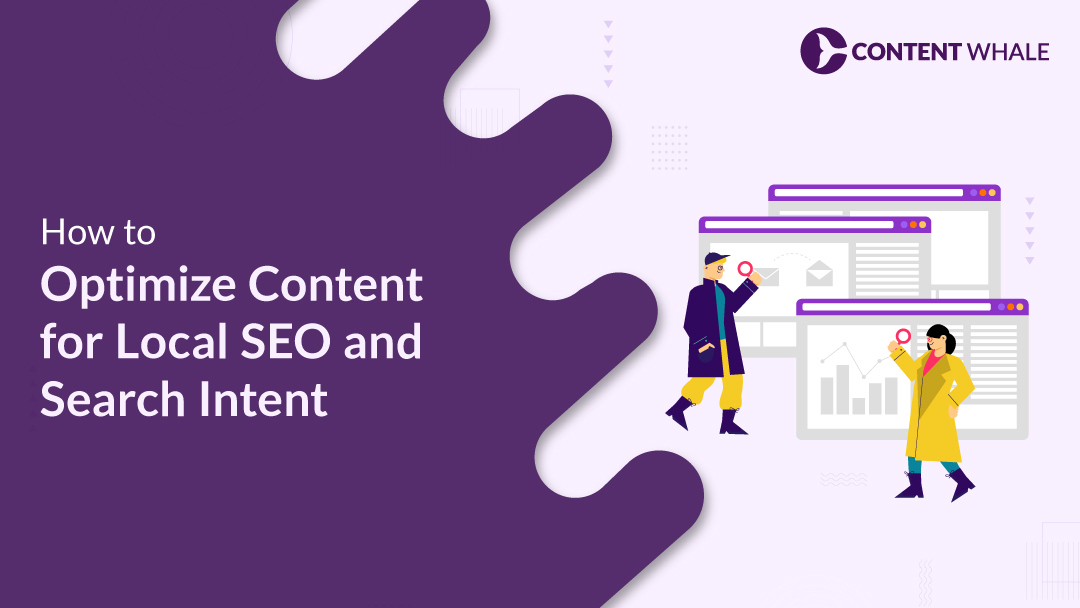Optimizing content for local search intent is essential for businesses looking to attract customers within specific geographic areas. Local SEO helps businesses appear in local search results, making it easier for potential customers to find them. Below is a comprehensive guide to optimizing your content using key local SEO strategies.
Understanding Local Search Intent
Local search intent occurs when users perform location-based queries, often with transactional, navigational, or informational goals. Transactional queries might be “buy shoes in [city],” navigational queries might involve finding specific businesses like “Starbucks in [city],” and informational searches could be “best pizza near me.”
The difference between local and general SEO lies in how local SEO prioritizes proximity and location-based relevance. Local search algorithms focus on ranking businesses closest to the searcher while factoring in reviews, engagement, and NAP consistency.
Finding and Using Local Keywords

Keyword Research Tools
To succeed in local SEO, businesses should use tools like Google Keyword Planner, SEMrush, and Ahrefs to identify high-volume, location-specific keywords. This allows you to target your audience based on geographic factors.
Incorporating Local Keywords
For example, if you’re targeting “best restaurants in Mumbai,” incorporate this phrase in your title tags, meta descriptions, and headers. Don’t forget long-tail keywords such as “best Italian restaurant in Andheri” for even more targeted traffic.
Long-Tail Keywords
Long-tail keywords that include a location, like “plumbers in downtown Chicago,” not only attract more targeted traffic but also tend to convert better because of the user’s specific intent.
Optimizing Content for Geo-Targeted SEO
Location-Specific Landing Pages
Create dedicated landing pages for each region or city where your business operates. This helps in capturing location-based search traffic. Each page should include location-specific information like services or products available in that area.
NAP Consistency
Ensure that your business’s Name, Address, and Phone Number are consistent across all platforms, including your website, Google My Business, and local directories. This helps search engines validate your business’s legitimacy.
Localized Content
Writing content that resonates with your local audience, such as mentioning local events, partnerships, or community news, will make your business more appealing and relevant to local users.
Google My Business Optimization
Update your GMB profile regularly by adding relevant keywords, updating photos, and ensuring that your business hours are correct. This significantly boosts local search rankings.
Local Citations
Ensure your business is listed in local directories such as Yelp, TripAdvisor, or local chamber of commerce websites, as this boosts your authority in local search results.
Mobile Optimization for Local Search

Most local searches happen on mobile devices, so it’s critical to ensure your website is mobile-friendly. Slow-loading pages and unresponsive designs negatively affect your rankings.
Mobile Usability
Focus on fast-loading, mobile-optimized designs that reduce bounce rates. Responsive layouts that work seamlessly across devices will improve your user experience and local rankings.
Voice Search Optimization
Voice searches like “best restaurants near me” are increasingly popular. Optimizing your content for conversational, question-based keywords is vital.
Creating High-Quality Localized Content
Local Blogging
Write blog posts about local events, news, and trends to engage your community. This not only increases visibility but also boosts your authority as a local expert.
Customer Testimonials
Highlight local customer reviews and testimonials on your website to build trust with potential clients. Positive reviews from local customers also improve your search rankings.
Community Involvement
Mention any partnerships with local organizations, sponsorships, or events. This strengthens your connection with the local community and can improve your search rankings.
Tracking Local SEO Performance

To measure your local SEO efforts, use Google Analytics and Google Search Console to track traffic and keyword rankings. Google My Business Insights will show how many users find your business through local search.
Key Metrics to Track
Track KPIs such as local rankings, click-through rates, and conversion rates. Tools like Moz Local and BrightLocal can help audit local citations, improve local SEO and optimizing content for local search intent.
Conclusion

Optimizing your content for local search intent requires a strategic approach combining geo-targeted SEO, local keywords, and mobile optimization. By implementing these techniques, businesses can significantly boost their local rankings and connect with more local customers.
At Content Whale, we specialize in crafting high-quality SEO content that drives measurable results. With a deep understanding of SEO trends, user intent, and content optimization, our team ensures your business ranks higher, attracts organic traffic, and stays ahead of the competition.
Let us help you amplify your online presence and boost your business growth with tailored SEO strategies today!
Local and Search Intent SEO FAQs
How do I find the best local keywords for my content?
Finding the best local keywords for your content involves using tools like Google Keyword Planner, SEMrush, and Moz to identify search terms that your target audience is likely to use when looking for local products or services.
Focus on long-tail keywords that include your geographic area, such as “best coffee shop in [city]” or “affordable plumbing in [neighborhood].”
Additionally, analyzing competitor keywords and understanding local search intent can help you discover overlooked opportunities.
Ensure that these local keywords are strategically integrated into your meta tags, headers, and content to improve search visibility.
Why is mobile optimization important for local SEO?
Mobile optimization is crucial for local SEO because a significant percentage of local searches are performed on mobile devices. Mobile-friendly websites offer a better user experience, which in turn reduces bounce rates and increases engagement.
Moreover, Google uses mobile-first indexing, meaning it prioritizes mobile-optimized sites in search rankings.
Ensuring that your content is responsive, fast-loading, and easy to navigate on mobile devices is vital for capturing local search traffic, especially for users who rely on smartphones to find nearby services or products.
Mobile voice search is also on the rise, further emphasizing the need for mobile-friendly local SEO.
How does Google My Business improve local search rankings?
Google My Business (GMB) is a key factor in local search rankings. Optimizing your GMB profile can increase your visibility in local searches, especially in the Google Map Pack.
When potential customers search for businesses near them, your GMB listing provides essential information like location, contact details, hours of operation, and customer reviews. Maintaining up-to-date information and encouraging positive reviews can improve your rankings and credibility.
Furthermore, frequent updates with posts, images, and special offers on GMB can boost your engagement and drive more traffic, helping your business stand out in local search results.
What are local citations, and why are they important for local SEO?
Local citations are online mentions of your business’s name, address, and phone number (NAP) on local directories, review sites, and social platforms. These citations help search engines confirm your business’s legitimacy and relevance in a specific location, directly influencing your local search rankings.
Consistent and accurate citations across platforms like Yelp, TripAdvisor, and local chambers of commerce can boost your authority and visibility. Inconsistent information can harm your rankings, so it’s crucial to maintain NAP consistency.
Quality citations from authoritative local directories also improve your chances of appearing in search results, making them an essential element of local SEO.
How can I track the performance of my local SEO efforts?
To track the performance of your local SEO efforts, utilize tools like Google Analytics, Google Search Console, and Google My Business Insights.
These tools allow you to monitor local traffic, track keyword rankings, and measure how many users find your business through local search. You can also analyze metrics such as click-through rates, conversions, and mobile vs. desktop traffic.
Additional tools like Moz Local and BrightLocal can help audit your citations and track your position in local search results. Regularly reviewing these KPIs will help you identify areas for improvement and ensure that your local SEO strategy is effective.





